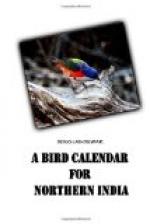Low from the brink the waters shrink;
The deer all snuff for rain;
The panting cattle search for drink
Cracked glebe and dusty plain;
The whirlwind, like a furnace blast,
Sweeps clouds of darkening sand.
WATERFIELD, Indian Ballads.
Now the burning summer sun
Hath unchalleng’d empire won
And the scorching winds blow free,
Blighting every herb and tree.
R. T. H. GRIFFITH.
May in the plains of India! What unpleasant memories it recalls! Stifling nights in which sleep comes with halting steps and departs leaving us unrefreshed. Long, dreary days beneath the punkah in a closed bungalow which has ceased to be enlivened by the voices of the children and the patter of their little feet. Hot drives to office, under a brazen sky from which the sun shines with pitiless power, in the teeth of winds that scorch the face and fill the eyes with dust.
It is in this month of May that the European condemned to existence in the plains echoes the cry of the psalmist: “Oh that I had wings like a dove! for then would I fly away, and be at rest”—in the Himalayas. There would I lie beneath the deodars and, soothed by the rustle of their wind-caressed branches, drink in the pure cool air and listen to the cheerful double note of the cuckoo. The country-side in the plains presents a sorry spectacle. The gardens that had some beauty in the cold weather now display the abomination of desolation—a waste of shrivelled flowers, killed by the relentless sun. The spring crops have all been cut and the whole earth is dusty brown save for a few patches of young sugar-cane and the dust-covered verdure of the mango topes. It is true that the gold-mohur trees and the Indian laburnums are in full flower and the air is heavily laden with the strong scent of the nim blossoms, but the heat is so intense that the European is able to enjoy these gifts of nature only at dawn. Nor has the ripening jack-fruit any attractions for him. He is repelled by its overpowering scent and sickly flavour. Fortunately the tastes of all men are not alike. In the eyes of the Indian this fruit is a dish fit to be set before the gods. The pipal trees, which are covered with tender young leaves, now offer to the birds a feast in the form of numbers of figs, no larger than cranberries. This generous offer is greedily accepted by green pigeons, mynas and many other birds which partake with right goodwill and make much noise between the courses. No matter how intense the heat be, the patient cultivator issues forth with his cattle before sunrise and works at his threshing floor until ten o’clock, then he seeks the comparative coolness of the mango tope and sleeps until the sun is well on its way to the western horizon, when he resumes the threshing of the corn, not ceasing until the shades of night begin to steal over the land.




